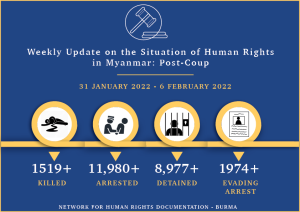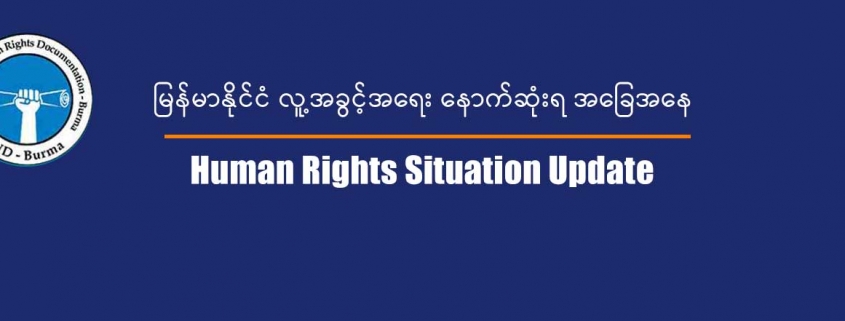Human Rights Situation in Myanmar: Post-Coup(January31- February 6)2022
 On 1 February 2021, a somber anniversary marked 365 days since the unlawful coup. Throughout the year, the regime used dozens of tactics to attempt to silence and squander the resistance movement. No matter the levels of extreme violence deployed, the spirit of the Spring Revolution has continued to persist in defiance of the junta. The freedom to live in peace is not worth giving up, and so people of all ages have shown their commitment to the renewed pro-democracy movement in many shapes and forms.
On 1 February 2021, a somber anniversary marked 365 days since the unlawful coup. Throughout the year, the regime used dozens of tactics to attempt to silence and squander the resistance movement. No matter the levels of extreme violence deployed, the spirit of the Spring Revolution has continued to persist in defiance of the junta. The freedom to live in peace is not worth giving up, and so people of all ages have shown their commitment to the renewed pro-democracy movement in many shapes and forms.
The junta is deeply unpopulation in Myanmar and has been for many years. Since their attempt at seizing power, they have become even more disliked. In studies conducted, confidence in Myanmar’s ‘leadership’ dropped 60 points in 2021 with a record number of people stating they don’t feel safe walking alone at night. The gallup poll found this drop in confidence to be the largest gap of any country in the last 15 years.
The international community has rightfully so been accused of ‘sitting and watching’ Myanmar’s economic, political, and social turmoil. Over 1500 people have been killed, thousands more unlawfully detained and evading arrest. Alongside record numbers of Tatmadaw soldiers defecting, the pr-democracy is alive and well in Myanmar. Yet, rather than willfully intervene to stop the violence and hold the junta leaders responsible, it seems that very often, the global actors have turned the other way.
As Rohingya human rights and democracy activist, Wai Wai Nu, stated so well in her appropriately tired editorial, The World Has Failed to Stand with Myanmar, the failure of the United Nations Security Council (UNSC) to act on the situation inside the country represents a “historic lack of support.” Since 1 February, the UNSC has met only behind closed doors and failed to engage with civil society groups who have been vocal in their calls for action and accountability.
The messaging has been clear from the people, and yet surprisingly the United Nations Special Envoy, Dr Noeleen Heyzer made comments during an interview with Channel News Asia suggesting power sharing with the Myanmar junta. Civil society rejected her comments. She should support solutions by the people who have made clear that their path forward does not include a dialogue with a regime with blood on its hands. A global arms embargo must be supported, alongside sanctions and an immediate referral of the situation in Myanmar to the International Criminal Court.
According to the Karen National Union, the Myanmar military has continued attacking the Karen National Liberation Army in a series of air and ground strikes which have led to the displacement of thousands of villagers. Women, children and the elderly remain extremely vulnerable and at risk. Naw K’nyaw Paw of the Karen Women’s Organization (KWO) expressed concern over the attacks, citing the many difficulties displaced people have been forced to contend with. KWO also documented two harrowing cases of a woman and child dying due to indiscriminate fire by the military junta. On 29 January, mortar shelling killed a 3-month old baby and a 20 year old woman. The next day, more firing destroyed a woman and injured an elderly woman who was struck on her head and chest.
The Karen Human Rights Group estimates over 100 000 people newly displaced between April 2021 and January 2022. The ongoing airstrikes have prevented villagers from being able to safely return home. The Tatmadaw has also cruelly scattered landmines throughout civilian areas, burned their homes and stolen livestock and their possessions.
KAYAH (KARENNI)
In January of this year alone, at least 45 people were killed by the military junta in Kayah (Karenni) State. Rights organizations including the Karenni Human Rights Groups have documented state-wide atrocities and condemned them in the harshest terms calling these attacks ‘inhumane’ and expressing commitment to prosecute perpetrators in the future. Among the victims, six died when they were shot at with airstrikes and four died while suffering from heart failure during artillery firing. Several other bodies found had evidence of serious trauma, including head wounds and visible lacerations. Men, women and children killed have been found in the ditches, and on the road. Almost 200 people in Kayah (Karenni) State have been murdered by the junta.
The Myanmar military has denied all involvement in the attacks and deferred responsibility without evidence to the civilian armed defense forces and Kayah (Karenni) based ethnic armed organizations. Clashes between the regime and joint Karenni forces have displaced almost 200 000 people. The Karenni Nationalities Defense Force stated that their forces have administrative control over 90% of territory in the State.
SAGAING REGION
Homes belonging to innocent villagers in Sagaing region are being burned to the ground by the Myanmar junta. On 2 February, more than 400 homes were razed by junta soldiers who accused residents of harboring civilian armed defense forces. One village said his whole village of Mwe Tone is now completely gone as 220 of the 265 homes were scorched. Witnesses recounted what’s left as ‘a pile of ashes.’ When the arson began, residents had no time to grab their belongings or livestock.
This attack is only the latest in a brutal onslaught of offensives which have taken place in Sagaing region over the last year. The displacement and indiscriminate attacks have made villagers more resentful and have garnered stronger support for anti-coup forces.



